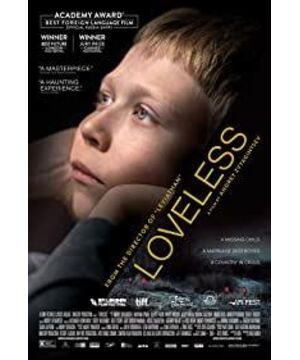"No Love to Tell" is the first main competition film in the media field on the first day of this year's Cannes Film Festival, except for the opening film. Compared to the opening film "Ismael's Ghost", this film can only be regarded as a well-established family drama.
Focusing on the subject matter may extend to discussions about society, responsibility, and life. People are arrogant, people are arrogant, people don't care about each other to the point where they are. Perhaps just like the director's focus as always, does this reflect a current social reality in Russia?
But from the story, the film as a whole is relatively simple.
A Moscow couple quarrels endlessly every day. They hope to sell the house they currently live in as soon as possible, because love has become farther and farther away from them. Obviously, the biggest victims among them are, of course, their children. Crying in front of the computer, crying in the toilet, crying in the bed, no one cared about him.
What the couple yearns for is to start a new happy life with their other half. Husband Boris has started living with a pregnant woman; wife Jenya is dating a wealthy man.
It was not until the son's departure that the couple had to get together to find the missing son.
The director uses a poetic photographic aesthetic to frame a Russian landscape from autumn to winter, which is a connection of time and space. The five-minute slow-motion autumn scene at the beginning of the chapter is empty, and at the end, it returns to the slow-motion frame-by-frame snow piles in winter. A story unknowingly tells a season so long ago.
The abandoned red and white knot that the little boy dragged between the fallen leaves on the ground and the soil is his desire for family connection, and it is also the demand for more connections in this society. The beginning of the knot is elegant in the air, and the end is still swaying on the tree, calm and uninterested.
Using space to express one's own thoughts and using time to satirize the oppression of society makes people have to think of the director's famous "Leviathan" before. In "Leviathan", the director's middle-class spirit was finally lost in alcoholism and betrayal, and this "No Love to Tell", at first glance, is an ominous omen of a family crisis, and a deeper reflection Seems like an indictment of Russian politics.
However, I think what the director wants to express is nothing more than a flood of empathy for the cultural core in crisis. It's just the understanding of this meaning, I'm afraid it's a candy coat added to the story. The delicate exterior looks like shiny tinfoil, but the inside is fudge that melts at high temperature. The story of not standing is uncomfortable.
I can only lie to myself and say that this is a dialogue that expands "no love to complain" to the love of the family, the love of the society, and even the love of the country. The tragic ending is like an abandoned knot on a tree swaying in the wind. Take it, waiting for someone who wants to climb up and take it off.
The director portrays the whole society as a rather romantic colored body, and the details of each stroke seem superfluous but are in fact very ingenious.
Husband Boris has to hide his divorce from the company because his boss is a fundamentalist Christian. In order not to lose his job, he had to find a way to hide from everyone in the sales department.
Wife Zhenya's lover takes her into the upper classes of Russia, into a fancy restaurant. In the restaurant, after the woman being flirted with charmingly gave her phone number, she calmly sat down to eat with her man; at the next table, several well-dressed girls gathered around and took selfies on their mobile phones. The hypocrisy and greed under these fake romances will never be shocking until they are exposed.
So what does all this have to do with missing children?
The film goes back to its roots and is actually quite Hitchcockian with deliberate social realism, evoking memories of Romanian New Wave periods such as "Two Days in Three Weeks in April" and "The Death of Mr. Lazarescu". .
To a certain extent, this is a duo of the first half of the family tearing up and the second half of finding the missing son. The two sides quarreled when they were together, and they separated and enjoyed their different lives. This is probably the life of people in the context of the Russian environment.
During this period, the son was unsupervised and unconcerned. It was not until the two realized that their son was missing that they realized that their love for their son was completely blank. They only care about themselves, only care about themselves, and then they don't complain about each other until things happen, start to regret, and start to look for it. This is a condensed microscopic scene of the family life drama.
To put it bluntly, there is a huge gap in the contrast between them, like a two-story story that was split at birth, and there is not enough transition. The contrast between before and after is direct and blunt, making people too late to return to their senses.
The only remarkable thing is that the film reflects the social reality of Moscow all the time. For example, in the second half of the film, in the search for the son, the Moscow police firmly believe that the child will return by himself after escaping, and do not care about the case at all. Instead, the local citizen group in orange jackets actively launched the search task, pasting posters and distributing leaflets. , looking for every corridor, every piece of wood.
This is a society rooted in corruption, and the shadow of this society has constructed such a loveless marriage, producing a family where children are not loved, cared for and taken care of.
The first pound of the main competition, with its dramatic aesthetics, rock-and-roll, laid-back style, and ever-blessing metaphor, quietly brings us the story of a broken family looking for a son.
This topic, not only in Russia, but also in the United States down to Japan, presumably this year's official selection of him is also a consideration that reflects the world's family view.
But, to tell the truth, apart from the stunning photography, this film can only be said to be watered and turned into a squib, neither loud nor loud enough to explode. Of course, discussing it as a political and social topic is a sufficiently conflicting topic. But looking at it as a movie with a storytelling, it may not be in place.
I think, isn't the most basic element of a movie telling a smooth and vivid story?
Written by Qiu Xiaomo (Cannes) Edited by Yu Xiaodao (Shanghai)
For more Cannes news, click to enter >>
View more about Loveless reviews









